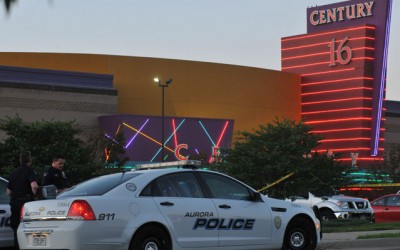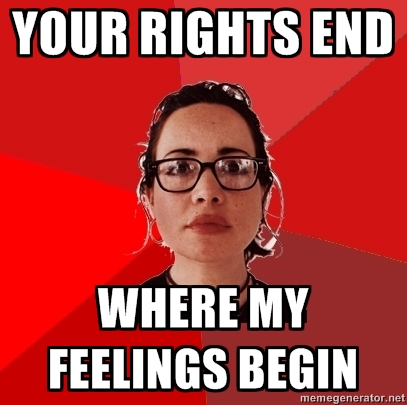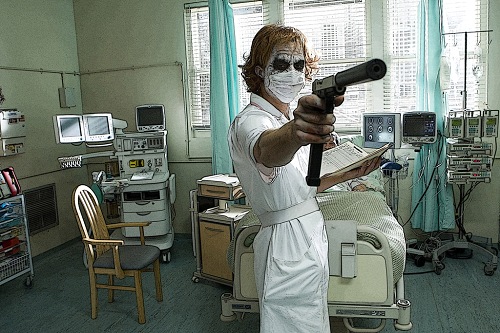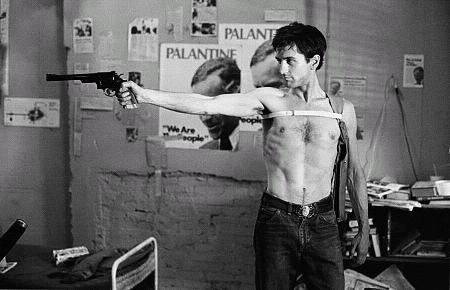Usually it’s not in my territory to write an essay, especially if it’s anywhere remotely in the political or ideological spectrum. Storytelling is my heart and soul, especially when it comes to comic books and films. That’s the area I’m content to writing about with zest and zeal.
However, it’s not usual that someone enters a theater playing a comic book movie and kills twelve people and injures another fifty-eight with an assault rifle.

I held off on writing an article like this. Quite frankly, I think it’s insulting to use such a tragedy as a springboard for an ideological platform or debate. It seems like every ratings grabbing reporter and zealous politician has descended upon Aurora like a pack of vultures.
However, this is yet another time when pop culture and the media have clashed over the issue of violence, and once more it’s important to voice one’s concerns and opinions before someone else voices it for you and acts upon it.
We can look back at the eighties when the scare was with heavy metal. Back when bands like Judas Priest were accused of creating subliminal suicidal messages and moral panic against bands such as Mötley Crüe.
But that’s not Aurora. I believe as of now, the mass public, or at least the majority of mainstream media, is too cynical to suggest Batman has subliminal messages and satanic connections. Especially since the headbangers of yesterday are now the middle aged of today.
Perhaps it’s closer to another Colorado tragedy. Columbine. A shooting spree that put gun laws under scrutiny, and Marilyn Manson and video games under greater scrutiny.
But even that was not Aurora. Video games and industrial music are a small sect of the pop culture world. Batman, including Nolan’s The Dark Knight trilogy, is an icon. The mainstream knows enough about him. At least in the sense that they know he doesn’t use guns and doesn’t encourage using them.
However, that doesn’t mean that the media hasn’t tried to insinuate The Dark Knight and The Dark Knight Rises with the killings. If you’ve been keeping up on the Aurora shootings on the nightly news, then you’ve probably heard such phrases as “He wore body armor like Batman,” “He dyed his hair red like The Joker,” “Audiences thought the gunfire was part of the movie,” and “He set up booby traps up in his apartment like The Joker would do.” Most of which is true, but there’s no doubt that it feels like it’s insinuating that both the Batman comic books and films influenced James Holmes.
Debate is already starting to brew. In The Hollywood Reporter, chief film critic Todd McCarthy, while on the side of the first amendment and violent films, suggests that while violent films can be a cathartic experience for most, it can be a dangerous delusion for a few that spirals out of control (in a very intelligent essay, if I say so myself). In the same issue, legendary director Peter Bogdanovich takes it a step further and says that “violent comic book movies” are a reflection of society and perhaps a numbing as well (including real life violence).
I could make the usual arguments I have in favor of violent stories. Such as the fact that Jason Holmes is one person out of the millions who have seen The Dark Knight. Which isn’t statistically even .01% (this goes for other films/video games/comic book controversies as well). I could point out that at the end of the day, we’re all responsible for our own actions (and that old saying “If your friend told you to jump off a bridge, would you do it?”). I could even go for the cheap, off-the-topic shot and say that politics and religion have caused more people to kill each other (and with great proof).
But regardless of what points I make, people can say that there’s the possibility that the Jason Holmes and Eric Harris of the world wouldn’t have done it if there weren’t violent stories. And that it’s not like we need violent stories, and what if banning/censoring/boycotting them could help prevent such tragedies, major or minor, from happening.

The more intelligent critics make valid points with these, and though I strongly disagree, they give valid enough reason.
So why should we allow violent stories? Aside from the “it’s freedom” argument?
Simple.
All stories are a Socratic exercise to an extent. The premise, regardless of whether it does or doesn’t have a plot, asks a question and delves further into that. What would happen if an OCD lawyer hooked up with a care-free hippie? What happens to a family when the mother has cancer? What happens when a man who believes in justice goes against a man who wants to watch the world burn?
Violent stories, especially ones like The Watchmen or Taxi Driver, explore violence through different viewpoints and philosophies; and others, such as Drive or Criminal, use violence as an art or even as entertainment. Violent stories in other words, help us think about such a dark subject in various ways, and provide a healthy cathartic experience.
However, the critics might bemoan, “Is your entertainment/’education’ worth the lives of Aurora?”
I say once more that massacres happen outside of entertainment (2011 Norway attacks anyone?), and that unless someone can prove me wrong, entertainment does not directly cause homicides. And I also ask this question: Do we want to live in a society that values free thinking, or do we want to live in a society that sacrifices stories for the possibility of security?
The Aurora tragedy has already affected entertainment. Security has been beefed up at theaters, Lionsgate isn’t planning on doing any midnight screenings for The Expendables 2, and Beware the Batman changed their realistic guns.
If another tragedy happens, such as a school shooter wears The Punisher t-shirt, or some obscure comic book gets connected to a husband blowing his wife away with a .44 magnum, you can damn well bet that there’s a good chance of a moral panic against comic books. And as with The Hays Code, the Comics Code, and even modern examples such as Body Count’s “Cop Killer,” the First Amendment isn’t a guarantee.
However, if you do believe that stories shouldn’t be censored, that our fears shouldn’t dictate our rights, and we should rise above the tragedy of Aurora, then support the arts and entertainment, go against your worries and actually take a trip down to your local theater, and for God’s sake, donate at least a dollar to support the Aurora victims.
Andrew Hudson
ahudson@comicattack.net
@Hudsonian



